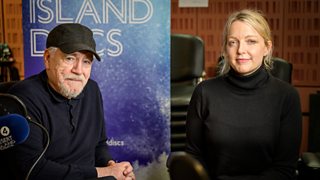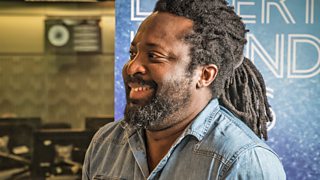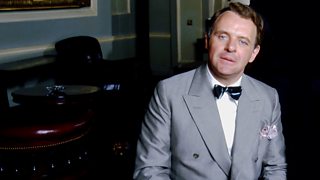10 things we learned from Brian Cox's Desert Island Discs
Born in Dundee in 1946, Brian Cox began his acting career in the 1960s. Among his most highly renowned roles are King Lear at the National Theatre and Hannibal Lecter (styled as Lecktor) who he was the first actor to play on screen when he starred in Michael Mann’s movie Manhunter in 1986. His awards include an Olivier, an Emmy and a Golden Globe, the last of which he won in 2020 for his role as billionaire patriarch Logan Roy in the HBO drama Succession. These are some of the things we learned about him when he spoke to Lauren Laverne on 大象传媒 Radio 4.
1. He caught the acting bug as a toddler performing to family at New Year
Asked about his earliest acting memories, Cox – the distant youngest of five children – recalls entertaining large gatherings in his family home at New Year’s Eve parties in his early childhood. “We had a window recess and there was a bunker where we kept the coal, and there were curtains. And my sister May – who was a very flamboyant singer, wonderful singer, my sister – she would say: ‘Presenting Brian Cox!’ and she’d swing open the curtains and I would do [Al] Jolson impersonations,” he says with glee. “The thing was, one o’clock in the morning on New Year’s Day there would be a lot of drunken people in the room, but they would be so giving. And I just thought: ‘Wow! This is good.’ I was about two and a half, three!” A star was born.
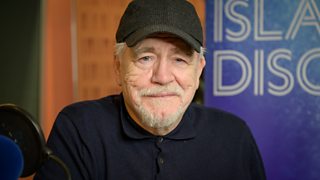
2. He spent every night he could at the cinema when he was young
Cox chooses The Drifters’ song Saturday Night at the Movies because the movies is where he spent his youth. “This is my childhood. I spent more than Saturday night at the movies,” he says. “I spent all my time at the movies. So I know what that was; I know what that is. Not just Saturday night at the movies; if the song was called Every Night at the Movies it would be more accurate.”
3. Cox’s father died when he was eight and the family were left with crippling debt
He speaks matter-of-factly about the tragedies of his youth: “My Dad died when I was eight and my Mum had a series of very severe nervous breakdowns, so she had electroshock treatment so she was institutionalised for much of my childhood. But until that happened, until I was eight, life was blissful; really very happy.” His father had run a grocery shop and, Cox says, had been “the centre of the community. But at the same time, people were poor and he gave people a lot of credit. And he died within three weeks of his diagnosis with pancreatic cancer.” The suddenness of his death left the family is a desperate situation: “We were left with debts,” says Cox. “My mum had a breakdown – it was just horrific.”
4. His family became so poor they would sometimes go hungry
“I’ve always had issues about money, because we didn’t have any,” Cox says. “When my mum came out of hospital, finally, she got a small job but she mainly lived off her widow’s pension. Her pension would come on a Friday and sometimes on a Thursday night, not always but sometimes, we wouldn’t have any food. And I would go across to the local fish and chip shop and we would get batter bits from the back of the pan and that would be our tea for a Thursday night. It sounds clichéd but it’s true. It instils in you a sense of value in stuff.” Cox credits this experience with having bestowed on him a socialist outlook for life: “Poverty is what makes you a socialist,” he says. “When you know poverty then you know about how we need to take care of our people.”
5. He loves clothes and is a bit of a hoarder
Cox selects a sewing kit as his desert island luxury, and he admits to being passionate about his attire. "I have a thing about clothes," he says. "I have a bigger wardrobe than my wife, I’m ashamed to say. But I love clothes.” He traces a tendency to hoard them back to his childhood poverty: “I think it’s one of those things that you’re left with, you know? It’s a kind of insecurity that makes you do that. It has to come out somewhere and it comes out in the most extraordinary ways.”
6. He saw The Beatles at a party in Dundee – but they didn’t see him
Cox struggles to select a favourite Beatles song to take to his desert island, settling on Get Back, and says of the 1960s: “It was a time of incredible social mobility, and it was the time of The Beatles.” And he remembers nearly, but not quite, meeting two of them on one of their early tours: “I once went to a party in Dundee and they had been playing,” he says. “There were two guys lying fast asleep, and one was George Harrison, and one was Ringo Starr. They were clearly exhausted the poor guys. I never met them but that was all I saw of them.”
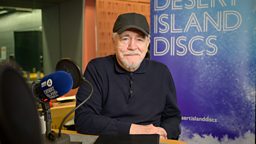
7. He blagged his first theatre job by pretending to know about classical music
Cox credits two of his teachers – George Hackett and Bill Dewar – with seeing something in him and supporting in his schooldays. Dewar, in particular, introduced him to the local Repertory theatre and suggested he apply for a general dogsbody role there when an older student of his quit it to head off to drama school. “I got an interview and went to the office,” says Cox. “I remember they were asking me about classical music; of course I knew nothing.” However, his school music teacher has just been playing the trumpet march from Aida, so Cox replied: “Well, you know, I really do like Verdi. I think Aida is one of my favourites. Particularly the trumpet march.” Although he thinks the interviewer “kind of knew that I was blagging it,” he still got the job.
8. He cut his teeth in repertory theatre in his early 20s but thinks his acting then was ‘terrible’
Cox’s first professional acting jobs in the theatre came as part of repertory companies, first at the Lyceum in Edinburgh then in Birmingham. It gave him the opportunity to play a vast array of roles and find his way as an actor. “It was an amazing time and I went to the West End – that was my first journey to the West End when I was 21,” he recalls, but is blunt about his youthful promise: “I was terrible in all of the roles, it has to be said, but it was a wonderful, wonderful experience. Young actors don’t get that experience now, it’s just a shame.”
9. He tried the Hollywood life but it didn’t suit him
Cox currently resides in New York and still loves his Scottish homeland, but could never live in LA. “I remember I went to Hollywood in the seventies,” he says. “The life then – the fastness of the life, the glibness of the life – is something that I really couldn’t take. I really couldn’t handle it. I just came back, did my work, as my old friend [actor] Fulton Mackay used to say: ‘Follow your mercenary calling and draw your wages.’”
10. He shares only his misanthropy with his Succession character Logan Roy
In the last couple of years Cox has had phenomenal success playing a Rupert Murdoch-like media tycoon in Succession, but the character is almost entirely unlike him. “I think Logan and I both have one thing in common: we find the human experiment rather disappointing,” he says. “I flirt with misanthropy all the time, but I’m an optimist so I always come down on the good side.”

More great listens from Desert Island Discs
-
![]()
Listen to Marlon James's Desert Island Discs
The writer Marlon James shares the eight tracks he would take to a desert island.
-
![]()
Listen to Gene Wilder's Desert Island Discs
Sue Lawley's castaway is actor Gene Wilder.
-
![]()
Listen to Arundhati Roy's Desert Island Discs
Arundhati Roy, Booker Prize-winning writer, is interviewed by Kirsty Young.
-
![]()
Listen to Anthony Hopkins's Desert Island Discs
Roy Plomley's castaway is actor Anthony Hopkins.
